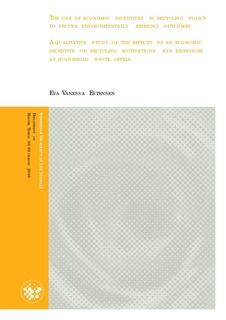| dc.description.abstract | Economic incentives (EI) are increasingly being used to secure environmentally friendly behavior. The rationale is based on the predictions of neoclassical economic theory, which assumes stable preferences. However, preferences are influenced by institutions according to the classical institutional economic theory. The involvement of EIs may change the norms by attracting an ‘I’ rationality that focuses on own utility, instead of a ‘We’ rationality that focuses on the social group. Existing empirical findings suggest that EIs may have the opposite of the intended effect. Moreover, theories suggest that they may ‘crowd out’ initial motivations or ‘reframe’ recycling from a ‘domain of morality’ to a ‘domain of economy’. Therefore, a better understanding of the effects is called for. This study looks upon recycling practices at the household waste level in three municipalities in Norway where an EI has already been implemented. A thorough overview of how the Pay-by-the-bag renovation system in the municipalities work was gained through structured interviews with representatives from the renovation companies and municipality offices. The first objective of the study is to investigate whether the use of EIs is effective in increasing recycling behavior and whether it is an optimal instrument to use. The second objective is to contribute to the literature on what motivates recycling and how they may be influenced by economic incentives. The third objective is to support that individual preferences and choice are influenced by the surrounding institutions, which the neoclassical economic theory does not accept. Using semi-structured, in-depth interviews the participants describe the effect the EI had on their motivations to recycle and recycling behaviors. This study revealed that the main effect the EI was that 63% of the sample decreased their delivery frequency of unsorted waste. Moreover, only a quarter of the sample increased their recycling. Hence, 37% did not change their recycling routines and habits. Perceptions of the EI influence the effect it had. Meanwhile, the norms surrounding recycling may have weakened due to the EI by that it does not match the ‘domain of morality’ which recycling is within. Also, and the monetary aspect discredits that recycling is for the environment. ‘Crowding out’ of motivations is not indicated in the results; however a reframing from ‘We’ rationality to ‘I’ rationality is may have occurred in some participants. Hence, EI are not an optimal long term instrument. An initial study mapped out various motivations to recycle in two institutional settings; one without an EI and one with. Three variables that had changed between the two settings are further investigated in this study, namely; sense of duty, positive and negative feelings. The results were that around half of the sample felt neither duty nor feelings attached to recycling, yet they recycle. It is suggested that for some, recycling is a habit that was learned early and not necessarily a behavior with emotions attached to it. However, 48.4% of the sample felt ‘wrong’ if they threw a material in the wrong bin, while 51.6% felt positive feelings when they recycled. Here, the feelings are seen as consequences of adhering or breaking a norm. Many of those who did not feel sense of duty to recycle increased their recycling due to the EI. It is argued that the reason why some people do not recycle or are not motivated to before the EI provided a motivation, is that they are unsure of whether the material is actually recycled or of that it is environmentally beneficial. In view of that only a quarter of the sample increased their recycling and the negative consequences of, it is concluded that the EI is not an optimal instrument to use on a long term scale. | no_NO |
